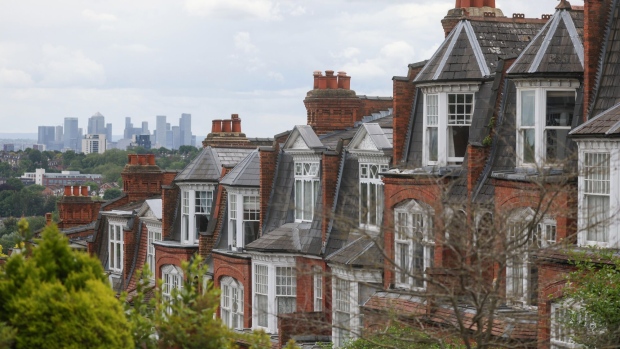Jun 16, 2024
Britain’s Wealthy Home Sellers Hold Off Listings Before Election
, Bloomberg News

(Bloomberg) -- Britain’s wealthy homeowners are holding off on listing property for sale after Prime Minister Rishi Sunak’s surprise move to call a general election made them hesitant about big decisions.
The number of new home sellers was little changed in June from levels a year ago, maintaining a supply shortage, Rightmove said in a report Monday. The online property portal said it was “especially at the typically more discretionary top-end of the market” that people backed away from listing their places for sale.
The average price of homes coming to the market remained near at record high at £375,110 ($475,060) this month, dropping just £21 from May. Buyer demand is stabilizing and is now 5% above last year’s levels, indicating most people planning to move house were undisturbed by the election, according to Rightmove.
“Some potential sellers appear to be watching and waiting rather than taking action, evidenced by a dip in the number of new sellers coming to market, particularly at the top-end,” said Tim Bannister, Rightmove’s director of property science. “This is understandable when many of these sellers have more flexibility over when they act. Overall, it appears to be business as usual for the mass-market.”
It’s the Bank of England rather than politics than that’s delaying a rebound in the housing market after last year’s dip. Affordability remains stretched for prospective buyers, and investors have pushed back expectations on when the central bank will cut interest rates from a 16-year high. The average five-year fixed mortgage rate is now 5.04%, up from 4.94% at the start of the year, Rightmove said.
What Bloomberg Economics Says ...
“A hotter-than-expected inflation print and looming general election mean the Bank of England will almost certainly hold rates steady in June. We think upcoming CPI releases, the first of which is due to be published the day before the BOE’s decision, will give it the confidence to start easing in August.”
—Dan Hanson and Ana Andrade, Bloomberg Economics. Click for the PREVIEW.
Rightmove’s report is the latest to signal that the housing market is stagnating. The Royal Institution of Chartered Surveyors last week indicated a cooling in sentiment, with new buyer demand down to a six-month low. That’s exacerbating a shortage of property to rent.
The struggle to get on the housing ladder is emerging as a key issue in the general election on July 4. The Labour opposition, leading by 20 points in polls, is vowing to build more homes and provide mortgage guarantees to first-time buyers, while the ruling Conservative Party pledges to scrap stamp duty for first-time house purchases up to £425,000.
Easing wage pressures and a pick up in unemployment could add to evidence of retreating inflationary forces, giving BOE policy makers scope to cut rates shortly after the election.
Forecasters anticipate official figures out this week to show inflation returning to the BOE’s 2% target for the first time in three years. They see no change in the central bank’s key rate when officials release their next decision on June 20.
“We expect that the improved market activity levels and conditions this year will result in higher transaction numbers at the end of 2024 than last year,” Bannister said.
The housing market avoided predictions of a crash last year, instead only recording a mild decline. Part of that is due to unemployment remaining less than a point above a five-decade low. That helped cushion household incomes even as the economy dipped into a mild recession last year.
The number of overall vacancies remained above pre-Covid levels in May, falling just marginally from a month ago, according to figures published Monday by the Recruitment & Employment Confederation.
“The number of active job adverts remains above 1.7 million which shows steady demand for workers despite slow progress in the wider economy,” said Neil Carberry, chief executive at REC. “Employers are intent on hiring and investing in their own business, but are acting more cautiously because of economic and political uncertainty. We expect this to change as inflation stays low and interest rates drop over the summer.”
©2024 Bloomberg L.P.







